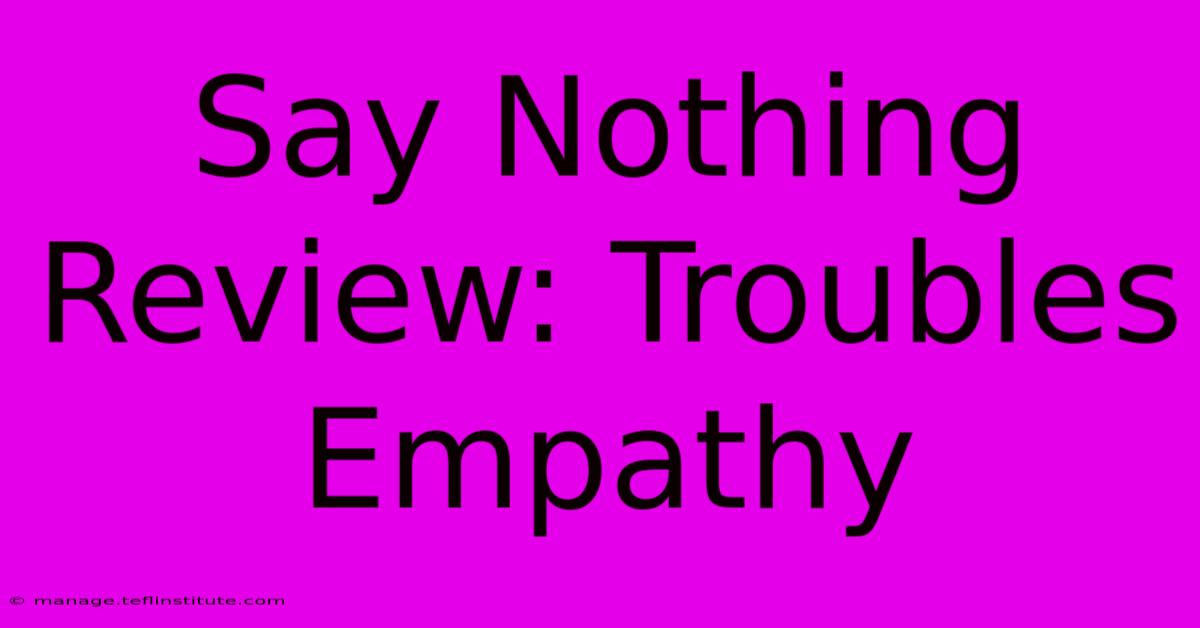Say Nothing Review: Troubles Empathy

Table of Contents
Say Nothing: A Review – When Empathy Fails to Bridge the Divide
Patrick Radden Keefe's Say Nothing: A True Story of Murder and Memory in Northern Ireland is a meticulously researched and gripping narrative of the Troubles in Northern Ireland. While undeniably compelling in its detail and humanizing of its subjects, the book raises complex questions about the limits of empathy and the enduring scars of political violence. Keefe's masterful storytelling allows readers to connect with individuals caught in the brutal conflict, but the very nature of the violence and the entrenched sectarianism challenge the ability to truly understand, let alone forgive.
The book centers around the 1972 abduction and murder of Jean McConville, a widowed mother of ten, by the Provisional Irish Republican Army (IRA). Keefe expertly weaves together the stories of McConville, her children, the IRA members involved, and the British soldiers operating in the context of the conflict. This multi-faceted approach allows for a nuanced understanding of the historical context, exposing the brutality of both sides and the everyday horrors faced by ordinary civilians caught in the crossfire.
However, the very depth of Keefe's investigation also reveals the limitations of empathy. The acts of violence described are often so profoundly disturbing, so devoid of any moral compass, that even the most empathetic reader will struggle to fully reconcile themselves to the perpetrators’ actions. Keefe avoids simple moral judgments, instead presenting the perspectives of both republican and loyalist paramilitaries, exposing the deeply ingrained ideologies and historical grievances that fueled the violence. He demonstrates how the “just cause” narratives, so readily embraced by both sides, allowed for the dehumanization of the “other” and the justification of unspeakable acts.
This nuanced portrayal, while laudable in its commitment to historical accuracy, also presents a challenge. While we are invited to understand the motivations of those involved, this understanding doesn't necessarily equate to forgiveness or acceptance. The sheer scale of suffering, the lingering trauma experienced by victims and their families, and the enduring sense of injustice make it difficult to reconcile with the perspectives of those who perpetrated such violence. The book acknowledges this inherent difficulty, refusing to offer simplistic solutions or easy resolutions.
This lack of easy answers, however, is not a weakness. Say Nothing ultimately serves as a powerful reminder of the lasting consequences of political violence and the complex interplay of individual agency and historical forces. It compels us to confront the limitations of our own empathy, to acknowledge the deep-seated divisions that can fracture a society, and to grapple with the ethical complexities of understanding those who have committed horrific acts.
The book's success lies in its ability to evoke a visceral response in the reader. We are not simply presented with historical facts; we are drawn into the lives of the individuals caught in the maelstrom, experiencing their pain, their fear, and their struggle for justice. This emotional connection is powerful, even if it leaves the reader grappling with the unsettling knowledge that complete empathy, in such a context, might be an unattainable ideal.
In conclusion, Say Nothing is not just a historical account; it's a profound exploration of the human capacity for both cruelty and compassion, a testament to the enduring power of memory, and a sobering reminder of the challenges of achieving reconciliation in the aftermath of political violence. While it challenges the limits of empathy, it does so in a way that is both insightful and deeply affecting, making it a vital and essential read.

Thank you for visiting our website wich cover about Say Nothing Review: Troubles Empathy. We hope the information provided has been useful to you. Feel free to contact us if you have any questions or need further assistance. See you next time and dont miss to bookmark.
Featured Posts
-
Parliament Row Haka Insults Over Bill
Nov 15, 2024
-
Paul Mescal Rocks Cartier On The Red Carpet
Nov 15, 2024
-
England Wins Carsley Stars Tuchel Encouraged
Nov 15, 2024
-
Robert F Kennedy Jr S Vaccine Stance
Nov 15, 2024
Latest Posts
-
Pitbull Tickets Limited Uk Dates On Sale Today
Nov 15, 2024
-
Last Chance Pitbull Uk Tour Tickets Today
Nov 15, 2024
-
Get Pitbull Tickets Uk Tour Final Sale Today
Nov 15, 2024
-
Pitbull Uk Tour Tickets On Sale Now Limited
Nov 15, 2024
-
Secure Pitbull Tickets Uk Tour Final Sale Live
Nov 15, 2024
-
Pitbull London Concert Date Venue Tickets
Nov 15, 2024
